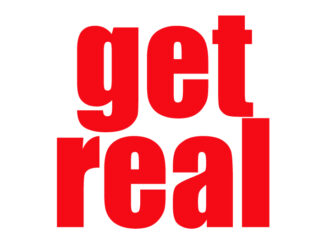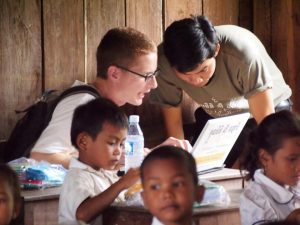“Get Real” will be a regular post from Ponheary, Lori or Travis about real challenges we face daily in the operation of Ponheary Ly Foundation.
By Travis Thompson, PLF Executive Director
A large part of my role in Cambodia is overseeing the Ponheary Ly Foundation volunteer program, which, lately has involved making some big changes to reflect our evolving ideas. You’ll notice the differences starting now.
 Throughout the past seven years, PLF has hosted hundreds of volunteers, many of whom have become more like family, staying heavily involved with us even after they leave Cambodia. Without you–without all the folks who’ve been here, met us, worked with our students, and gone home to become advocates, raising money and awareness–PLF wouldn’t be around. Indeed, the majority of our funding comes from people like you, people who feel a deep connection to our students and projects.
Throughout the past seven years, PLF has hosted hundreds of volunteers, many of whom have become more like family, staying heavily involved with us even after they leave Cambodia. Without you–without all the folks who’ve been here, met us, worked with our students, and gone home to become advocates, raising money and awareness–PLF wouldn’t be around. Indeed, the majority of our funding comes from people like you, people who feel a deep connection to our students and projects.
Our volunteers bring creativity, skills, and energy to schools badly in need of those things. Volunteers also become our voices in the world, they spread the word about our work and bring more people into our family, which then allows us to improve our programs and go even deeper into our schools.
Our volunteers are not narrowly defined, indeed they are advocates. And, we want to bring them a new set of tools to place their efforts deeper into our operation. In the last Get Real post, PLF President Lori Carlson explained the challenges of involving volunteers in our work. Part of those challenges involve thinking creatively about how to bring traditional models of “volunteering” closer to the beating heart of the organization, so that the efforts of those who come can be authentic and useful.

Working inside a classroom at Koh Ker Primary with Field Director Rany Ly in 2012.
Now, we’re evolving the volunteer program to maximize all the good stuff that volunteers do, and allow our students to gain more from the experience. The first change you’ll see is that volunteers will now be joining us under “The PLF Advocate Program”. During the application process, we’ll be asking more questions, and asking advocates before they arrive to prepare specific workshops to carry out at our schools that last at least two weeks. Further, we’ll be asking them to get involved with us before they arrive, and after they leave Cambodia, by using our new, online toolkit for spreading the word about PLF and raising money for our initiatives.
We know we’re risking turning potential volunteers off by asking them to try to raise money. We know people don’t care for the “pay to volunteer” model, and that’s why we’ve always kept costs at bare minimum, asking volunteers only to cover their transportation and room at Seven Candles Guesthouse. But, this new move, asking volunteers to try to raise money for PLF projects, is because we’ve found that when volunteers talk about their plans, and our organization, with their family, friends and social networks beforehand, and afterward, and put out the effort to raise funds, they are more invested in their experience and more likely to take something from their time here that will shift their lives.
We’re not setting any minimum amount of money to be raised, we won’t be rejecting anyone based on how much they raise. We’re only asking that the effort be given. Previous PLF Advocates have found it easy to fundraise, like Advocate Sarah Gordon who raised enough to send three young women to high school, and Adam Pawlikiewicz who’s biking across the United States for PLF. Essentially, we’re looking for people who not only want to help, but want to show up prepared and engage with our projects, and Cambodia, on a deep level.

PLF Advocate Torsten Tabel helping host an environmental course at Srayang Dorm.
Ultimately, we hope that our new Advocate program will lead people who spend time with us in Cambodia to a shift in their lives similar to the one former PLF university volunteer Noah Strouse had, and recounted, during his school’s recent commencement speech in New York:
“Lori looked at us and asked point blank: ‘So why are you here?’ At the time, our answer was simply that we wanted to help; we wanted to volunteer. However, today, almost a year later, I’ll answer differently: we were there to develop a visceral understanding of ourselves as powerful and privileged, and to become deeply, critically aware about who we are in relation to the rest of the world so that even after we had left the country, we would choose to do the work that matters. By fighting harder and smarter. By finding the cracks within the seams. Volunteering is showing up; civic engagement is showing up and paying attention.”

So good. Thanks for this Travis and for all the hard work you have put into our volunteer program during the last year. You’ve turned something that has the potential to be a negative energy into a positive and edifying experience, not only for our students and their teachers, but also for the people who come over to work. It’s not an easy balance and you are becoming a maestro~!
Noah’s words are what we, as volunteers, should strive to achieve. To pay attention, not merely show up. What an outstanding young man! Let’s hope we all begin paying attention.
Travis, I applaud this long and hard. I have been advocating for a change in the program for some time, and I am so glad to see that you have found a key to change that can help us on the ground, and in the hearts of the many that pass through the PLF.
“It is not men’s minds we must change, it is their hearts.”
Great! Keep us updated on how it goes.